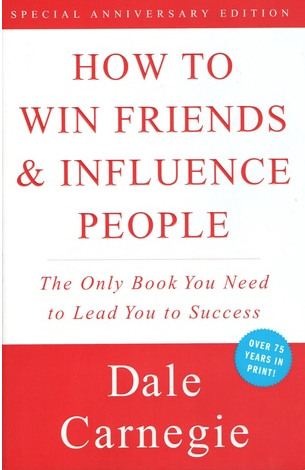Drawn from the Centre for Australian Army Leadership reading list and The Busy Platoon Commander’s Reading List, this book reminds me of John Carter. A film about a Civil War veteran transported to Mars, it was released in 2012 and bombed at the box office. Based on the 1917 book A Princess of Mars, the film was lambasted as highly derivative. However, the opposite is true.
Author Edgar Rice Burroughs’ space opera is one of the original classics and is openly credited by George Lucas, Steven Spielberg and J.J. Abrams, among others, as having inspired them. It informed sci-fi classics like Superman, Avatar, Star Wars, and Star Trek, so in 2012 audiences instinctively recognised much of the story line, characters and ideas from other hit films.
I found the same to be true for How to Win Friends and Influence People.
Published in 1936, Dale Carnegie was a “farm boy” from Missouri who “created one of the most significant movements in adult education” with seminars of the same name as his novel. He recorded lessons from these into the ‘grandfather’ of leadership books. It has since informed so many other works on managing relationships and building authentic connections that its ideas didn’t strike me as novel or unique anymore.
Indeed, where newer books speak to modern audiences, at times the language in Carnegie’s ‘leadership bible’ feels quaintly antiquated which makes it harder to embrace. He uses words that have fallen out of use, like ‘perspicacity’ and ‘obstreperous’; names that belong in the last century, like E.G. Dillistone and Prince Bernhard von Bülow; and shares one anecdote after another from business people with titles like “the chairman of the board of directors of one of the largest rubber companies in the United States”.
This aside, I enjoyed Carnegie’s book because it isn’t academic and impractical. Its principles are immediately applicable and I found myself taking steps to strengthen and improve my personal and working relationships before I’d even finished reading. In his own words, “perusing it won’t do you any good unless you apply it,” and the book empowers you to do this by encapsulating the ‘think big, act small, move fast’ approach.
While many of his ideas won’t be novel, the principles he encourages you to employ can be timely reminders to try something different in your ‘same old, mostly effective’ leadership approach. Carnegie admonishes, “you who are reading these lines possess powers of various sorts which you habitually fail to use”, and every leader should be open to more readily deploying their existing powers to be better. You don’t even have to learn anything new, just be more attuned to what already exists.
These principles are tools in “what every successful person loves: the game”.
About the Author: Samuel J. Cox is the editor of Grounded Curiosity. Find him on Twitter.

